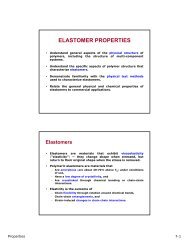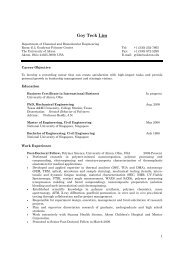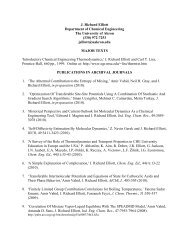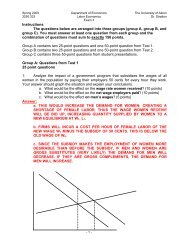Sociology of the Anarchists - Gozips.uakron.edu - The University of ...
Sociology of the Anarchists - Gozips.uakron.edu - The University of ...
Sociology of the Anarchists - Gozips.uakron.edu - The University of ...
Create successful ePaper yourself
Turn your PDF publications into a flip-book with our unique Google optimized e-Paper software.
Utilitarian organizations<br />
Bureaucracy<br />
rationality<br />
Ideal type<br />
Characteristics <strong>of</strong> bureaucracy:<br />
Division <strong>of</strong> labor<br />
hierarchy <strong>of</strong> authority<br />
Rules and regulations<br />
Qualification-based employment<br />
Impersonality<br />
Shortcomings <strong>of</strong> bureaucracies<br />
inefficiency and rigidity<br />
resistance to change<br />
perpetuation <strong>of</strong> race, class, and gender inequalities<br />
Anarchistic <strong>The</strong>ories <strong>of</strong> Organization<br />
Herein two <strong>the</strong>ories <strong>of</strong> “ideal types” <strong>of</strong> organizations will be reviewed, which are ra<strong>the</strong>r<br />
anarchistic in nature. <strong>The</strong> first is from Rothschild-Whitt (1979) called “collectivistdemocratic<br />
organizations” and <strong>the</strong> second is from Fitzgerald and Rodgers (2000) called<br />
“radical social movement organizations”. <strong>The</strong>se two models <strong>of</strong>fer a compelling look at<br />
alternatives to both bureaucratic-rational organizations and moderate social movement<br />
organizations.<br />
Rothschild-Whitt (1979) argues that <strong>the</strong>re are eight characteristics <strong>of</strong> collectivistdemocratic<br />
organizations. She bases her model upon worker collectives, and generally<br />
does not imply such a structure for social movement organizations.<br />
1. Authority: “Authority resides in <strong>the</strong> collectivity as a<br />
whole; delegated, if at all, only temporarily and subject<br />
to recall. Compliance is to <strong>the</strong> consensus <strong>of</strong> <strong>the</strong><br />
collective which is always fluid and open to<br />
negotiation.”<br />
2. Rules: “Minimal stipulated rules; primacy <strong>of</strong> ad hoc,<br />
individuated decisions; some calculability possible on<br />
<strong>the</strong> basis <strong>of</strong> knowing <strong>the</strong> substantive ethics involved in<br />
<strong>the</strong> situation.”<br />
3. Social Control: “Social controls are primarily based on<br />
personalistic <strong>of</strong> moralistic appeals <strong>the</strong> election <strong>of</strong><br />
homogeneous personnel.”<br />
4. Social Relations: “Ideal <strong>of</strong> community. Relations are to<br />
be wholistic, personal, <strong>of</strong> value in <strong>the</strong>mselves.”<br />
5. Recruitment and Advancement: “(a) Employment based<br />
on friends, social-political values, personality attributes,<br />
and informally assessed knowledge and skills. (b)<br />
Concept <strong>of</strong> career advancement not meaningful; no<br />
[ Williams 70 ] [ this is a draft. do not cite. ]






